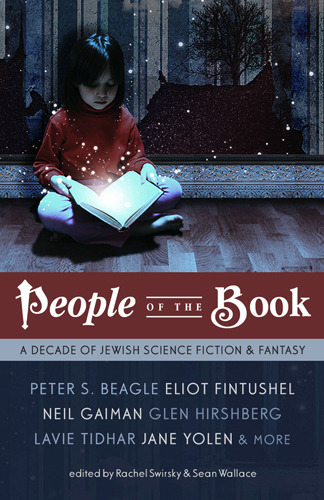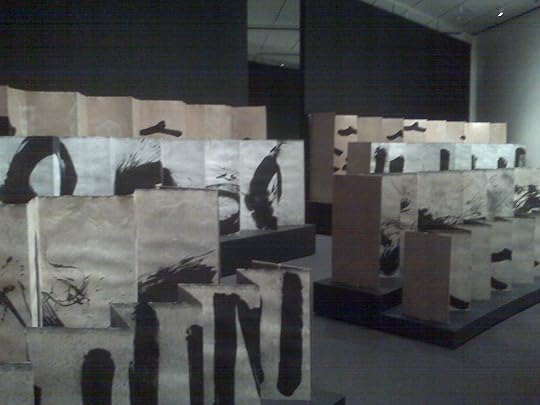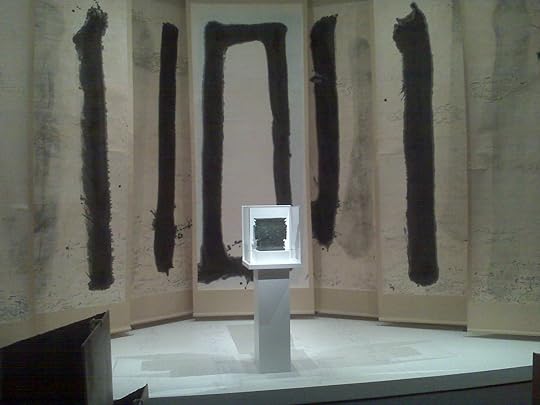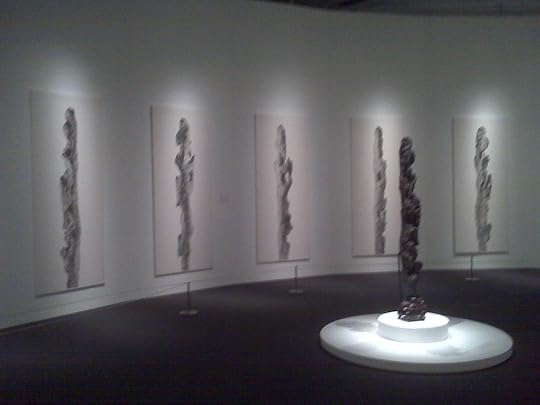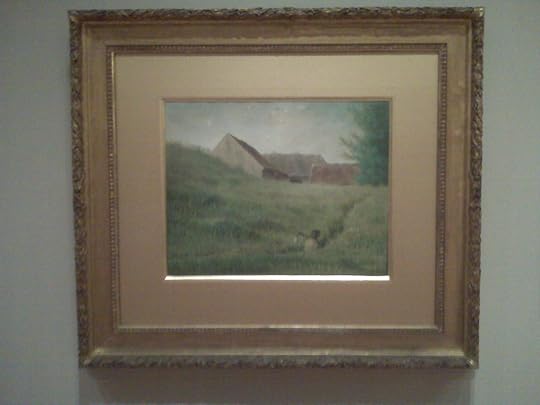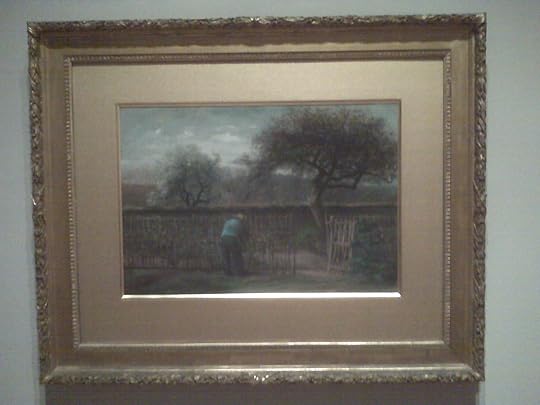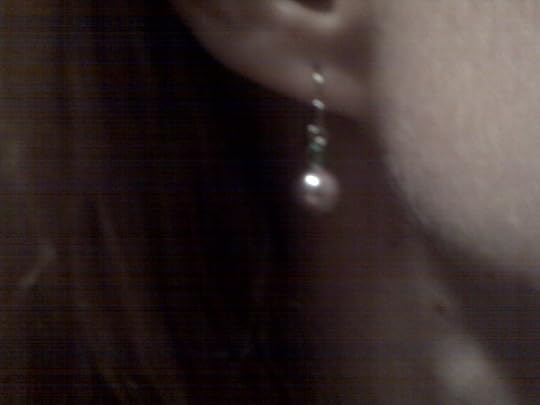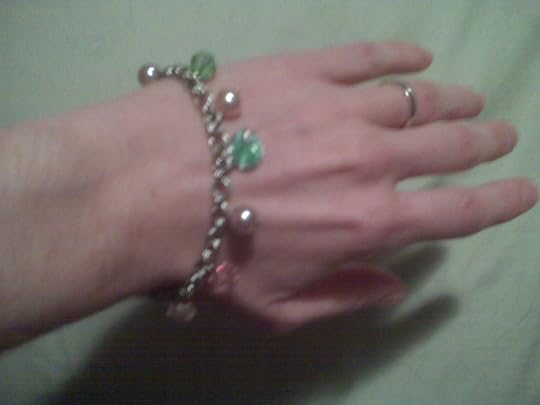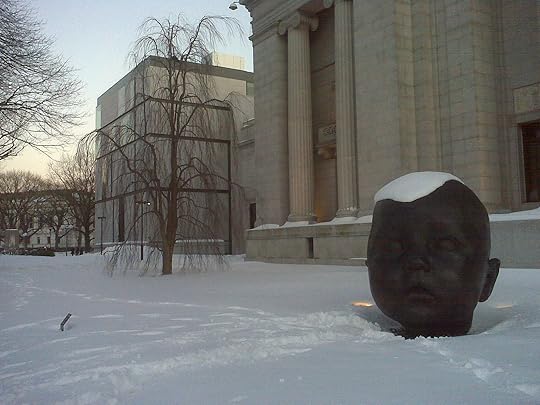Theodora Goss's Blog, page 69
February 3, 2011
Wicked and Lovely
This is for you, my sisters.
First, a video of Seanan McGuire's "Wicked Girls Saving Ourselves":
Second, some of the lyrics from the song. ( Here are all of the lyrics in Seanan's songbook: "Wicked Girls".)
This is now it starts:
"Wendy played fair, and she played by the rules that they gave her;
They say she grew up and grew old – Peter Pan couldn't save her.
They say she went home, and she never looked back,
Got her feet on the ground, got her life on its track.
She's the patron saint priestess of all the lost girls who got found.
And she once had her head in the clouds, but she died on the ground."
And here is my favorite stanza:
"Susan and Lucy were queens, and they ruled well and proudly.
They honored their land and their lord, rang the bells long and loudly.
They never once asked to return to their lives
To be children and chattel and mothers and wives,
But the land cast them out in a lesson that only one learned;
And one queen said 'I am not a toy', and she never returned."
I particularly like this one because it gives me a completely different version of Susan, not the Susan of the Narnia books, not even the Susan of Neil Gaiman's "The Problem of Susan." This Susan is proud, more like the proud Jadis who ruined Charn with the Deplorable Word. Whom C.S. Lewis cast as a villainess, of course. (I've always wanted to write the story of the White Witch from her own perspective.)
And this is the chorus:
"Dorothy, Alice and Wendy and Jane,
Susan and Lucy, we're calling your names,
All the Lost Girls who came out of the rain
And chose to go back on the shelf.
Tinker Bell says, and I find I agree
You have to break rules if you want to break free.
So do as you like – we're determined to be
Wicked girls saving ourselves."
You know who those are, right? Dorothy from The Wizard of Oz, Alice from Alice in Wonderland, Wendy from Peter Pan, Jane from Mary Poppins, and Susan and Lucy from the Narnia books.
I find that I agree with Tinker Bell too. She's certainly one of the wicked girls, as you'll know if you've ever read Peter Pan. Considerably more wicked than the Disney version. Even her name, Tinker Bell, makes her sound disreputable (a tinker is an itinerant mender of pots), although of course she's lovely as well.
You have to break rules if you want to break free.
There are so many rules, so many things society tells you to do, and if you want to break free, you have to decide what you want to do – and be. Particularly how you want to be a girl. Because society tells you how to be one, but you can't listen to that, not if you want to save yourself. Not if you don't want to end up in some gray Kansas.
And this is a stanza about girls who are not in any books, doing their own things, being wicked in their own ways:
"Mandy's a pirate, and Mia weaves silk shrouds for faeries,
And Deborah will pour you red wine pressed from sweet poisoned berries.
Kate poses riddles and Mary plays tricks,
While Kaia builds towers from brambles and sticks,
And the rules that we live by are simple and clear:
Be wicked and lovely and don't live in fear –"
The last two lines are a sort of anthem, aren't they? I think I should write them out and put them over my desk. I think I should recite them any time I am afraid.
And this is the last stanza:
"For we will be wicked and we will be fair
And they'll call us such names, and we really won't care,
So go, tell your Wendys, your Susans, your Janes,
There's a place they can go if they're tired of chains,
And our roads may be golden, or broken, or lost,
But we'll walk on them willingly, knowing the cost –
We won't take our place on the shelves.
It's better to fly and it's better to die
Say the wicked girls saving ourselves."
Our roads may be golden, or broken, or lost, but they'll be our roads. The singers in that video are artists, walking their own roads. And they probably pay a price – we all do. We are less secure, we are more tired, we are criticized. But if you're a certain kind of person, there's really no alternative. There's your road, and no other road will do. And even when it's broken or lost, at least it's yours, you know? You can't live another person's destiny.
It's better to fly and it's better to die free. (Unless you take the risk, I'm not sure you get to fly.)
I'm tired today, and I'm not entirely sure where my road is. But this song reminds me that I'd rather be wicked and lovely and free than just about anything else. And that I'm responsible for saving myself.
My friend Emily Gilman has written a post about this song called "Wicked Girls Saving Ourselves." Go read it if you'd like another perspective. And maybe we should form a club, wear rings with WG engraved on them or something. Honestly, I think this should be our theme song!








February 2, 2011
February
February is going to be a difficult month.
I just want to give you fair warning, in case I complain about it. Because I have so much to do, and I'm tired already even though it's only the second day. But all the things I have to do are good things to get done, so there's that. They're all projects I've taken on because I want to do them.
And there have been some wonderful things happening already. For example:
1. My poem "Ravens" has been nominated for a Rhysling award. It will be appearing in the Rhysling Anthology.
2. My stories "The Mad Scientist's Daughter" and "Fair Ladies" are on the 2010 Locus Recommended Reading List. Those are the only stories of mine published in 2010, so to have them both listed was especially wonderful.
3. I will be at Boskone from the 18th to the 20th. I've received my preliminary schedule, which may change. It looks as though I'll be on six panels and doing a reading. I'll post my final schedule as soon as I get it!
4. My first Folkroots column is coming out this month and will be available soon, both in Realms of Fantasy and online. I'll let you know as soon as it's available!
5. I just received copies of People of the Book, the wonderful anthology of Jewish science fiction and fantasy edited by Rachel Swirsky and Sean Wallace. My story "The Wings of Meister Wilhelm" is reprinted in it. Look, isn't it gorgeous?
So there are wonderful things happening. But I'm tired and I have so much to do and there's just so much snow on the ground, and there's still an awful lot of winter before spring comes.
Still, one thing I've learned as I've gotten older is that time passes, inevitably. You can't stop it from passing. What you can do is decide what you want to do with that time. And everything I'm doing matters, it's all important, it's all going to become a whole, something larger than itself.
This is a post about Imbolc, isn't it? About the old festival, also called St. Brigid's Day, that marked the beginning of spring, when you don't actually believe that spring is coming because for goodness sake, look at all that snow! And you feel tired and restless at the same time. I didn't realize that when I began writing it. But it's about that specific time of the year when something begins to rise in you, like sap.
You're still in the darkness of winter. Yesterday, I was looking at myself in the mirror on top of my dresser, and I saw myself in that darkness, so I decided to take a picture of it:
The branch of acorns at the bottom of the picture: I picked that up last fall. It's in a small vase on my dresser, with a candle and a bowl of shells and a talisman with a swan on it. It reminds me that this is all a cycle. And so while I stand in the darkness, the light is coming, and there are already buds on the trees, and under the ground the bulbs are beginning to sprout.
There's so much winter yet. But the light is returning.








February 1, 2011
Mythpunk
I've been wanting to write about Mythpunk since JoSelle Vanderhooft's interview of Catherynne M. Valente came out.
But I didn't have time. And then a week later there was a Mythpunk Roundtable with Amal El-Mohtar, Rose Lemberg, Alex Dally MacFarlane, and Shweta Narayan, moderated by JoSelle.
And at some point I found Niall Harrison's blog posts: Mythpunk and amimythpunkornot.com. All on Strange Horizons.
It was interesting to see that several of the above mentioned me. I also ended up in the Wikipedia definition of mythpunk:
"Described as a subgenre of mythic fiction, Catherynne M. Valente uses the term 'mythpunk' to define a brand of speculative fiction which starts in folklore and myth and adds elements of postmodern fantastic techniques: urban fantasy, confessional poetry, non-linear storytelling, linguistic calisthenics, worldbuilding, and academic fantasy. Writers whose works would fall under the mythpunk label are Catherynne M. Valente, Ekaterina Sedia, Theodora Goss, and Sonya Taaffe."
And Niall Harrison quantified my mythpunkness in one of his blog posts:
"In The Forest of Forgetting by Theodora Goss
"Myth-y? We're going to need a working definition of myth at some point, aren't we? Dictionary.com is suitably vague: 'a traditional or legendary story, usually concerning some being or hero or event, with or without a determinable basis of fact or a natural explanation.' Plenty of that in Goss's fiction, from — as Matt mentioned last week — 'The Rose in Twelve Petals' to more recent fiction (and more recent myths) in last year's 'The Mad Scientist's Daughter.' ****
"Punk-y? Back to the dictionary: 'a style or movement characterized by the adoption of aggressively unconventional and often bizarre or shocking clothing, hairstyles, makeup, etc., and the defiance of social norms of behavior.' Transpose that to fiction, and in addition to the stylistic points listed in the TVTropes definition, I'd suggest there has to often be an element of the contemporary injected into a story for it to qualify as punk. 'The Rose in Twelve Petals' is perhaps Goss's most obviously confronting story in this respect, although she's written plenty of more conventional narratives; as Abigail notes in her review of the collection, however, there's 'a free-spirited disdain for social conventions" in a good number of Goss's tales. ***'
And I'm going to be on a Mythpunk panel at Boskone. So I guess I'd better write about it, to figure out what I think about it, right?
Here are some basic thoughts.
What is Mythpunk anyway? Well, I think Cat defined it very clearly. It involves working with fairy tale, folklore, or myth. And then you punk it. About punk, Cat says,
"I've always considered the appending of -punk to whatever other word to indicate that X is not merely being explored or ruminated upon, but in some sense broken, harmed, and put back together again with safety pins and patches, a certain amount of anxiety, anger, and messy, difficult emotionality expressed in the direction of X. Additionally, I look for some of the aesthetic of punk – they may be three chords used by everyone, but if you shred them hard enough and scream loud enough they can become something new."
I think Mythpunk is generally written by female writers who grew up on subversive fairy tale retellings. We may have seen the Disney versions of fairy tales, but remember that we did not have DVDs. We did not watch them repeatedly, obsessively. And there was no Disney Princess culture when we were growing up. We were told the fairy tales themselves, and then when we were – probably around twelve, but certainly in our teens, we started reading the retellings. I'm guessing they were as important in the lives of other writers who can be identified as writing Mythpunk as they were in mine. Do you remember Tales from the Sisters Grimmer? And the fairy tale series published by Terri Windling and Ellen Datlow? And Robin McKinley's Beauty? I think we were reading those, and they came as revelations. At least they did to me. And then we read Angela Carter, who blew our minds.
And so we took the traditional material – the fairy tales, folk tales, myths – and we started playing with them, because that's what our foremothers had taught us to do. In other words, we were not the first wave of fairy tale retellers. We were the second wave, and learned from the first. And we did it, perhaps, a little differently. Because those first-wave fairy tale retellings generally did not involve stylistic innovations, and we do stylistic innovation like it's the air we breathe. In a sense it is, because we grew up when postmodernism was being discussed and practiced. So we practice a sort of Mythpostmodernism. But that doesn't sound as nice.
Would I actually consider my writing Mythpunk? Well, sometimes. I think there are stories of mine that do exactly what Cat described. "Rose in Twelve Petals" is one, "Sleeping with Bears" is a retelling of "Snow White and Rose Red" although I'm not sure anyone is likely to catch that. And other stories of mine certainly create new fairy tales, new mythologies: "The Rapid Advance of Sorrow," "Singing of Mount Abora." "Child-Empress of Mars" is a sort of Mythpunked science fiction.
Is it a useful designation? I think it is, actually. It does seem to be describing what a particular group of writers is doing at the moment. There's something to writing identified as Mythpunk that does make it distinctive. It's fantasy – not dark fantasy, not urban fantasy, not whatever it is people are doing now that involves vampires. Fantasy proper, but with stylistic experimentation. It's Virginia Woolf with fairies and gryphons and blemmyae. With all sorts of strange but wonderful monsters. It doesn't have the darkness of New Weird and is not indebted to Lovecraft. It's not really slipstream, because rather than making you uncomfortable it says, "Here are the monsters, get comfortable with them." It is political because it presents a world where social conventions don't apply, where to be different is to be normal, and to be ordinary is to be odd. It embraces beauty and strangeness as normal conditions. And it is definitely not interstitial, because as soon as you say something is Mythpunk it is no longer between things, it is a thing.
It started in the small presses because larger presses did not want to take a chance on something so different. Fairy tale retellings – those it could handle. But these were fairy tale retellings with a difference. However, the more Mythpunk is out there, the more not-different it becomes, so you can say, "This is like Orphan's Tales."
I also see in it a richness, an almost overflowing of inventiveness and language. In that way, it is like New Weird, which was also rich and overflowing.
Do we really need all these labels, all these punks? We probably don't need them. But because of them, certain writers and works are talked about. So they enable us to have conversations we did not have before. They allow us to notice writers we might have overlooked. And they allow those writers to speak and say, "This is what I am. Or am not."
And that's generally good, I think. It's part of the inventiveness of our genre, of fantasy writing in general. We are the inventors, the creators of worlds. It would be strange if we didn't invent literary movements once in a while.








January 31, 2011
Beauty, Meaning, Purpose
This is what I meant to post yesterday, but did not have time to.
I've been thinking a lot about my writing lately, and it seems to me that the best writing I do has three things: beauty, meaning, purpose. I suppose I should explain what I mean by those things.
Beauty: I don't mean beauty in a narrow sense here. What I mean is that, simply in order to interest a reader, what I write should be aesthetically pleasing. It should give the reader pleasure, enjoyment. That's the price of entry, in a sense. If I can't write well, in a way that pleases the reader, it doesn't matter if my writing has meaning or purpose, because the reader won't read it. The reading experience itself won't be enjoyable. Beauty can take all sorts of different forms. Transparent prose can be beautiful, if done well. Mannered prose can too. And beauty of writing does not mean that the content itself has to be beautiful. A description of garbage can provide aesthetic pleasure.
Meaning: What I mean by this term is that the story should have some sort of meaning, should provide the reader with an understanding of some sort. Or at least, I think my best stories do. This is separate from the aesthetic pleasure provided by the prose. It's a more intellectual response. It causes the reader to go something like, "Oh yes. Interesting. I hadn't considered that."
Purpose: In a sense, this is the most difficult to describe. It's about engagement. The reader can respond aesthetically and intellectually without necessarily engaging in a personal way with the story. A beautiful, meaningful story can still leave the reader cold. Here I have an anecdote to help me explain what I mean. This is something I heard one of those corporate marketing types say. (I know, but sometimes they say something useful.) It was this: Nike advertisements are not about the shoes, but about what you can do with them. They show pictures of athletes. They make the viewer think, perhaps I can be an athlete too. I think the stories of mine which are most successful give the reader something he or she can take away. I'll call it inspiration.
This, by the way, is what Rainer Maria Rilke was talking about when he described the archaic torso of Apollo. It provides us with beauty and meaning, but it also does something more, according to Rilke: it says, "You must change your life." (Apollo, Nike. Hey, they're both Greek gods.)
I think those are three things we want from stories: we want to enjoy them, we want to find meaning in them, we want them to engage us, even inspire us. So that, in some small way, they begin – or perhaps we begin – to transform our lives. Ultimately, I think we want that transformation, and we can find it in James Joyce or we can find it in the latest D&D tie-in novel. It has nothing to do with genre, and I'm not sure it has much to do with literary quality the way we usually define it (which places Joyce above the D&D tie-in). We want stories to change us.
So, my stories should have: beauty, meaning, purpose.
My reader should get out of them: pleasure, understanding, inspiration.
But if I start writing a story saying to myself, I'm going to write a story with beauty, meaning, purpose, I will never, ever finish another story again. And if I do, it will be dreadful. So once I identify these components of my best writing, I have to forget them. Instead, I have to substitute the following:
My stories should have: characters, setting, plot.
I have to think as a craftsman. But all this stuff about beauty, meaning, purpose that I'm about to forget, I can keep somewhere in my head – in a sort of box, carved and painted. And sometimes a part of me that I'm not conscious of can open the box, look inside, and remember.
Beauty, meaning, purpose. Now, forget you read the above.
This post will self-destruct in five minutes.








January 30, 2011
Museum Sunday
It's Sunday, so of course we went to the Museum of Fine Arts. I can't go more than a week without a banana split. Or art. I'm not actually sure which is more important.
This post is going to be mostly pictures, because there's something else I want to write about, which I'll get to later today. But here's a brief synopsis of our trip.
First we went to the café, because we have to go to the café first. That's not my rule, it's Ophelia's. And when you have a six-year-old who wants a fancy cheese plate and hot chocolate, there's not much hope of looking at art before she gets them.
But afterward we had some time to look at two exhibits. The first was Fresh Ink: Ten Takes on Chinese Tradition, which has been there for a while and which we've seen several times already. But Ophelia loves wandering through it. It's her favorite exhibit at the museum right now. Here are some pictures:
The second was Millet and Rural France. I loved this one. It's along a hallway, a somewhat hidden hallway between one part of the museum and another. But the drawings are so fresh, so precise. They give me a sense of freedom, of beauty, as though I really were walking through the French countryside in the nineteenth century. Here are some pictures that will do no justice at all to Millet:
Then we went to the gift shop, because when you go to the museum with a six-year-old you can't not go to the gift shop. And even though Ophelia had already spent her allowance this week, I bought her an art project, and I bought myself the earrings that went with my Christmas present. Here is one of the earrings (pink pearl and green crystal):
And here is my Christmas present, a bracelet based on Monet's waterlily paintings (pink pearls, pink and green crystals, green enameled waterlilies):
And then we left the museum through what I call the Big Baby Head entrance. There are two Baby Heads, and they both had snowy caps, which was really quite funny. Here is one of them:
It was a very nice way to spend a Sunday afternoon. My favorite way.








January 29, 2011
Follow Me
You probably remember that I was a corporate lawyer. So I'm fairly comfortable with corporate ways of thinking and speaking. Well, lately I've been hearing a lot about "author platforms." Authors are supposed to build their platforms. And I understand that term – it's very much corporate speak – although I don't particularly like it. Know why? Because it's not an interesting metaphor. A platform is a flat surface on which something else happens, and the sorts of things I've heard described as parts of an author's platform are not flat, not inert. They are alive, dynamic.
If we are going to be writers, and we may as well be – writers, not just authors – then we need better metaphors. When we blog or use facebook or tweet, we do not build platforms. We create something that has a life of its own, an online presence that is always changing, that does not simply support our writing but is instead a dynamic part of our writing lives. I mean, look at the exercises I'm doing on this blog. Some of them will become stories. And parts of my stories will later appear here, perhaps creating new ideas for exercises. And I will likely teach some of those exercises in writing workshops. I'm not building a platform but interweaving the different parts of my writing life so that they create a changing, living whole.
And I think about that writing life not just as a businessperson but as a creative person. As someone who can understand the corporate mindset but also takes her guidance from fairy tales. For example, if you're going to do something, I believe in doing it three ways. That sounds like it came out of a fairy tale, doesn't it? It's a rule of threes.
My writing life has three components. The first is the most traditional component: it exists on paper. My books are part of it, but so are any pamphlets I put together. Anything a reader can hold in his or her hands that has my writing on it. The second is also a fairly traditional component: it's the part in which I'm physically present, at a convention or a reading. I'm there, and the reader can meet me or listen to me, have me sign books. The third component is online. The lines between those three components are not as sharply drawn as they used to be. Is a Kindle more like a physical book, or like going online? If I read a story and post the recording online, is that like going to a reading? But in general, you know what I mean. My writing life has those three components, and I don't want to neglect any of them. I certainly don't want to stop creating things that readers can hold and have signed. I don't want to stop meeting readers. And I don't want to stop being an online presence either, because that is the way I communicate about the other two aspects of my writing life. In a sense it's what holds the other two aspects together. Without it, how would you be able to find my books or know where I will be?
And because I'm a writer, and I think magically, I wanted that online part of my writing life to have three components as well. So now you can follow me three ways:
1. You can come to this website, which will always be here. And if you're interested, you can read this blog.
2. You can friend me on facebook, and you'll know what I'm thinking and doing day to day.
3. As of today, you can follow me on twitter. Look to your right: you'll see my latest tweets below my facebook icon. Click on Latest Tweets to see everything I've tweeted so far. And notice how nicely I decorated my twitter page! I'm really rather proud of it. I'm still getting used to twitter, and to be honest I'm not quite sure what I'll be tweeting about yet. But you know me. I will probably tweet quotations I like, and about writing and art. The sorts of things that interest me, and that I think might interest you. That's the third leg of my online stool, as it were, and I like that metaphor better than a platform, although it still doesn't express what I see as the complexity and vitality of our writing lives now, when we have so many ways to write, so many media in which to express ourselves.
Come follow me . . . I may lead you down a rabbit hole or to Never Never Land. But knowing you, you're not going to mind that, right?








January 28, 2011
Tillinghast House
I've decided that every Friday, I'm going to write part of the Shadowlands serial. If you want to read parts that I've already written, go to Serial. There, you can read all about Thea Graves, Matilda Tillinghast, Emma Gaunt, and Mouse, from the beginning.
Tillinghast House was one of those brownstones near Newbury Street that look so expensive – and are. You could just tell that it had been standing a hundred years ago, when there had been carriages rolling up and down the Boston streets, and that it would have taken a whole team of servants to keep it up.
We were dressed warmly, because although it was September, there was already a chill in the air. But not in our school uniforms, of course. We had put on the darkest pants and shirts and jackets we could find. We stood across the street from Tillinghast House, trying to look inconspicuous under the street lamp.
"The kitchen door is around back," said Matilda. "We have to get over the wall into the garden, and then it will be easy."
"Oh, after we get over the wall!" said Emma. "You didn't say anything about getting over a wall. What if it's covered with glass?"
"What if it's not? Anyway, I don't have another plan. Do you?"
Emma did not look happy. She's not the sort of girl that goes over walls, generally. I mean, she's a Gaunt.
"Come on," I said. "You can climb on my back. And there won't be any glass." At least, I hoped there wouldn't be.
We were lucky. No glass, although Emma did scrape her knee going over, and Mouse almost fell into a rose bush that still had some roses on it.
"Here it is," said Matilda when we had reached the kitchen door. She took out the key.
"Do we really want to do this?" asked Emma. "I mean, we are breaking and entering. What if we get caught?"
"Just entering," said Matilda. "We can't be breaking if we have a key. Anyway, Aunt Matilda said I could come visit her anytime. So maybe I want to visit on a Friday night."
"Wait," said Mouse. "I brought something." We turned to look at her. She was wearing a black cap over her head. White hair shines pretty brightly, even in lamplight. "I took an invisibility potion from Miss Gray's classroom before we left. They were making it in Magical Chemistry. I thought it might come in handy."
The invisibility potion was in a plastic juice bottle, and it tasted a little like orange mango. We all drank some.
"I can still see you," said Emma.
"We can all see each other because we're all invisible," said Mouse. "Can we just get inside already? I forgot to bring gloves, and I'm getting cold."
"You should always bring gloves," I said. "Because of fingerprints."
"We're not thieves," said Matilda. "Invited to visit, remember? I think the stairs are over here somewhere."
The kitchen was just under street level, and there were stairs leading up to the first floor. We went up them, as quietly as we could. Old stairs are creaky! Matilda, who was in front, opened the door at the top, and then almost shut it again.
"Someone's up there!" she said. She opened it again, just a crack. We could see light coming from a room down the hall.
"Go on!" I said. "It's all the way down there. We can sneak down the hall and listen. We'll hear if anyone's in the room. Anyway, we're invisible, remember?"
Following Matilda, we all sneaked down the hall, staying as close to the wall as possible. The floor creaked too! As we got closer, we could hear voices.
"How's the old lady doing?" asked a man's voice.
"She's well enough," a woman's voice replied. "Has all she needs, although not all she wants. She still won't tell us where she's hidden the key."
"Well, keep her in the portrait until she tells. She can die in there for all I care!" We heard the clink of class, and then a gurgling sound, as though something were being poured.
"You wouldn't actually kill her, Samuel!" The woman's voice sounded shocked, alarmed.
"What do you care? After what she and her friends did to you."
Suddenly, I felt Mouse move past me. She was sneaking closer to the door, past Matilda, who tried to hold her back. The door was partly open, and light came through the crack. She stood right next to it, so she could see into the room as much as possible. Matilda tried to reach for her again, but Mouse brushed her hand away.
"Well, we did go to school together. That counts for something, you know. When you get older, you remember things like that. School days."
"You're getting sentimental in your old age. Stuff it, girl. I'm not going to let my chance at that key get away. Ever since you told me about it, I've been thinking about how to get it for myself, and Matilda Tillinghast is going to tell me or I'll wring her neck as though she were a chicken."
"Samuel, how horrible! I'm sure that won't be necessary."
Mouse stepped back. She motioned to Matilda, waving at her to come forward, to look at – what? I moved forward too and caught a glimpse of it. At the far end of the room was a mirror, and reflected in it were two people – a woman in a gray dress and a man in a butler's uniform. She was sitting in one of the armchairs, he was pacing around the room with a glass in one hand and a decanter in the other. He stopped and drank from the glass, pouring whatever it was down his throat with a quick gesture. Suddenly, he stood still and said, "Did you hear something?"
"Not a thing, and you really should stop drinking, Samuel. You've had quite enough."
"I'll drink until I've drunk all the whiskey in her cellar!" he said. "But I'm sure I heard something."
"It must be mice," she said. "They kept me awake half the night, last night."
Matilda put her hand on Mouse's arm to pull her back and gestured for all of us to move back as well. We sneaked back down the hall, toward the kitchen. We did not stop until we had gone down the stairs, through the door, and over the wall.
When we were standing in the street again, Matilda said, "Well, I was right. That wasn't Aunt Matilda."
"Who was it, then?" asked Emma. "And was that really her butler? It didn't sound like any butler I've ever known."
"No, it wasn't her butler," said Mouse. "I don't think Matilda's aunt would hire him!" We all looked at her in surprise. Mouse never sounded angry. But she sounded angry now.
"Who is he?" I asked.
For a moment, she did not answer. Then she said, "He's my Dad."
"Your Dad?" said Matilda. It was the last thing any of us had expected to hear.
"Yes," said Mouse. "Everyone calls me Mouse, but name is Sophia Sitgreaves."
Matilda gave her a blank stare. But Emma gasped and I stepped back without thinking.
"What?" said Matilda. "What am I missing?"
"The Sitgreaves Murders," said Emma.
"Come on," I said. "Let's get back to the school. We can talk about it there."
We walked back through the dark streets, Matilda and I walking together, Emma walking with Mouse. You can't say the Gaunts don't have good manners. She wanted Mouse to know that we didn't think of her any differently, despite what her father had done.








January 27, 2011
The Tempest
Earlier this month, Nathan Ballingrud wrote a blog post called "Writing Around the Heart." This was the last line:
"I appear calm on the outside, but inside it's all wind and high seas."
I think that's a beautiful line, but I'm copying it here because I thought it was true about me as well. (Perhaps it's true of many writers.)
I seem like a calm person generally. And competent. (The thing about having a law degree from Harvard is that people assume you can do all sorts of things you probably, actually, have no qualifications for. Like organize a new writing program. They assume you have a kind of general competence. But it's me, too. I sort of seem that way.) But underneath the surface, there are all sorts of things roiling. Most often, creative ideas, but really all sorts of things.
Last week, I was at a faculty party, and I was talking to two of the other teachers. Both wonderful teachers, both people I like very much. And one of them asked me what I had done over the winter break. So I mentioned working on my dissertation, and writing my column, and another project I'm working on that I can't mention yet. And blogging every day. She told me it was amazing that I was doing so much, and then the two of them talked about the movies they had seen. They had seen four or five. And honestly? I kind of envied them. I had seen exactly one movie, and I had blogged about it. It seemed wonderful to be able to actually rest.
But the truth is, I'm not the sort of person who can rest for long. When I have time to myself, I usually start a new project. I think it's just that there's so much I want to do, and I always have more ideas than time to do them in. For example, if I had time now, what would I do?
1. I would start my first novel series. I have it all planned out.
2. I would start on one of the short story ideas I have. I have a lot of short story ideas, all plotted out. They just need to be written.
3. I would add more poems to Poems of the Fantastic and Macabre. It's still such a bare site, and there are so many poems I want to add.
4. I would e-publish some of my short stories, probably through Smashwords. Maybe even my entire first short story collection.
5. I would publish a poetry collection. There are several ways that could happen.
And that's to start with.
I think the thing is, I live at a certain level of intensity. Wind and high seas. Some of that intensity is emotional, some of it intellectual. And it finds expression in creativity, in making things. If I'm not making things, I feel lost somehow. I feel as though I'm failing – well, let me explain.
There are two things I've believed since I was a child. Perhaps they're strange things to believe, I don't know. The first of them is that I'm here for a reason. I have something to do, and the times I've been most sad in my life, even despairing, have been the times when I've felt as though I wasn't accomplishing whatever I was supposed to. It's as though Mother Night had given me a mission, and I was here to carry it out. So I always felt as though my life had a purpose, and I was here to fulfill that purpose. But I could fail, and I didn't want to fail.
The second thing I've always believed was that I got help. Somehow or other, things happened that taught me what I needed to know, to fulfill that purpose. I look back at my life and I wonder, about various things, whether they were a waste of time. Was going to law school a waste of time? But law school, and being a lawyer, taught me to write in a particular way. What about graduate school? That, too, taught me to write in a particular way, taught me so much about literature I could not have learned elsewhere. And I look at ostensible failures and realize that from another perspective, they're successes. Taking so long to finish my PhD – but if I hadn't, I wouldn't have begun my writing career.
So I get help, but I still have to fulfill my purpose, do whatever it is I was put here to do. And by this point I know, because I've known since I was a child and because by this point it's become obvious, that it's about writing. Writing is what I'm meant to do, not as an end in itself, but for an end I'm probably not going to be aware of, not going to understand myself until I stand in Mother Night's house and she explains it to me. And shows me which part of the pattern I am.
I suppose that's the surface calm: it's a kind of faith. And underneath, it's wind and high seas, and I'm living so intensely that every moment has its joys and despairs, its epiphanies. And the words come out, like a river.








January 26, 2011
Being a Brand
I read an interesting blog post recently: Rachelle Gardner on "The Dilemma of the Prolific Writer."
Rachelle writes about writers who are prolific – who write fast and well – and what they should do after the first novel sale. Because, and this is something I hadn't really thought about, the publisher will want to see the sales figures for the first novel before purchasing the second one. And so there's going to be a lag time after that first novel comes out, when the writer will probably have books written but won't be selling anything. (The same issue comes up with a two-novel sale, because the publisher will still want to see sales figures for the first novel before purchasing the third one. And a prolific writer will probably already have the third and fourth ones ready to go.)
During that lag time, Rachelle tells the writer to do the following:
"1) Keep writing. We should be able to sell those books eventually.
2) Since there's no hurry to write more books, spend more time on carefully building her brand and platform, including planning and writing her blog.
3) She can find other ways to make money from writing during this time. She can consider writing articles, or ghostwriting."
What particularly interested me in her list was the second suggestion, that the writer build her brand. I've noticed that writers don't particularly like to be referred to that way, as brands. And yet they are. We are.
Readers buy our writing based on our names, on whether they trust those names, what they expect those names to provide for them. Rather in the same way they buy Kleenex. And yet (you can quote me on this):
Writers are not Kleenex.
Our brands are who we are, not just as writers but as individuals. They are made up of our tastes, our aspirations, our beliefs about the world and other human beings. They are extensions of who we authentically are. So in a sense, we are brands that can't think of ourselves as brands, because as soon as we start to write how we think we ought to write, that authenticity is lost. We become Pepsi One.
I can't think, who do I want Theodora Goss to be? I have to think, who am I? What do I actually like? What do I want? Who do I want to become?
This issue came up for me recently in two ways. First, it came up because I was redesigning my website. (You know, this one.) It took me a while to get it looking exactly this way, in part because it took me a while to decide what I actually liked. But now, it feels so perfect. The William Morris wallpaper in my favorite color, the painting by Waterhouse up above echoing that color. The theme of the painting: what looks like a catastrophe is actually the start of something new and wonderful. Even the fact that Miranda, in the painting, looks like me from that angle. And I thought, yeah, that's a Theodora Goss website. I mean, it's me. It's all the things I love.
Second, it came up because I was asked to write a story for a themed anthology. And I just couldn't, and couldn't, think of a story that actually interested me. And then I sort of distanced me from myself, and thought about myself objectively. (Or tried to.) And I thought, what sort of story do I usually write? Well, I usually write stories about characters who don't have a chance to speak, who are silenced in some way. I give them a voice. And that's when the story came to me.
Oh, I'm not saying don't experiment. But if you're going to be a brand (and you're going to be), figure out who you are, what you stand for. That process can actually be fun and informative. You can discover so much about yourself. And for that, I highly recommend a blog. Writing this blog has been such a process of self-discovery. You may think that when I blog, I'm telling you things – but really what I'm doing is discovering them for myself. I'm figuring out who I am, what my brand actually is. Because like it or not, I am one, so it may as well represent who I am, what I care about. That will help guide my choices as a writer, because we all make mistakes, but if we hold to ourselves, we will make fewer of them. And our writing will be better, truer. Which is, after all, what it's all about, right?








January 25, 2011
The Art of Editing
I don't mean editing in the sense of editing my own stories. I mean professional editing, the kind of editing that results in books.
I learned to edit from two people. One was Delia Sherman, who taught me how to edit living writers. You know what I mean – writers send you their stories, and then you read through them, choose the ones you want to include in the anthology, contact the writers about problems, get those problems resolved. Then you decide on the order of the stories, write an introduction, that sort of thing. It's a lot of work, but so worthwhile, because finally you have an anthology that you conceived, writers you wanted to promote, whose stories you loved.
The other person I learned from was John Paul Riquelme, a scholar specializing in the work of modernists such as James Joyce and Oscar Wilde. I was his research assistant when he edited the Bedford Books edition of Dracula. He taught me how to edit the work of dead writers. For example, he taught me that the text you want to use is the last one approved by the author. That's why publishers usually reprint the final version of Frankenstein, the way Mary Shelley altered it, rather than the 1818 version. I think it was during my time as his research assistant that I learned how to locate the texts I wanted: what to look for, what was available to me.
From both types of editing, I learned a habit of precision. I think that's carried over into my writing. I think I have a way of writing in which every word counts – am I right about that? I think so . . . And every punctuation mark, of course.
So how does all that translate into my own editing? Well, several nights ago I decided to add a section on William Allingham to Poems of the Fantastic and Macabre. I had been looking at a website with art and poetry on it, and some of the poetry was by Allingham, and I remembered that he was more interesting than I had originally thought when I read "Fairies." That's the poem he's known for. You know, "Up the airy mountain, / Down the rushy glen . . ." I like it well enough, but he's not exactly W.B. Yeats, is he? He doesn't evoke the magic of fairies in the same way.
I thought it would be easy, because there was already quite a lot of Allingham online, and when a poem is already online, all I have to do is copy it and then edit. I don't always copy a poem, but it does save me the trouble of typing, and I can focus on the important task, which is the editing. Because every single poem I have ever copied, rather than typing myself, has had mistakes – either in wording or punctuation. How do I edit? I compare the poem to at least one copy that was published during or close to the author's lifetime. In this case, I looked at a book called Songs, Ballads, and Stories by Allingham, published in 1877. And I made sure that the poems on my site conformed to those. Honestly, where are other people getting their poems? Why do they have so many mistakes in them? And the mistakes are identical over various sites that include Allingham, so I think they're all copying each other – but without editing.
One advantage to looking at original texts is that I always find poems that aren't already online. In this case, I found a poem I've seen before, somewhere or other. I rather like it. Here it is:
The Witch-Bride
A fair witch crept to a young man's side,
And he kiss'd her and took her for his bride.
But a Shape came in at the dead of night,
And fill'd the room with snowy light.
And he saw how in his arms there lay
A thing more frightful than mouth may say.
And he rose in haste, and follow'd the Shape
Till morning crown'd an eastern cape.
And he girded himself, and follow'd still,
When sunset sainted the western hill.
But, mocking and thwarting, clung to his side,
Weary day! – the foul Witch-Bride.
That's macabre enough, right? And including it gives a very different picture of Allingham than you might get from just reading "Fairies."
This post is called "The Art of Editing," which if you think about it is simply the art of researching, reproducing, and being precise about it all. But I suppose a more important question is why edit at all? Why am I spending my time putting Allingham's poetry online when I could instead be writing my own poetry?
Well, one answer is that I wouldn't be spending that time writing my own poetry. Writing takes a different part of the brain than editing. When I'm too tired to write, I can still edit. Editing is something I do for fun, to relax. Although it can be frustrating as well. Another answer is that I need to take care of Allingham, and Dora Sigerson Shorter, and Alfred Noyes. If I don't make sure their poetry is available, who will? Perhaps someday, someone will preserve my writing in the same way.
If you look on the internet now, you will find the art of the pre-Raphaelites everywhere. So many people love it and pay attention to it. But I'm sure you remember when it was difficult to find, when museums hid it away in back rooms. I think we're going through a period like that with poetry. We've formed a poetic cannon, and poetry outside that cannon tends not to be available – except in obscure places online. But I think it's time to reevaluate a particular kind of poetry, as we've reevaluated the art of the pre-Raphaelites – poetry that is lyrical and fantastical, much of it written right around the period when the pre-Raphaelites were painting. I think that process is underway. Poems of the Fantastic and Macabre is part of it, and I'm proud of that.
You see, when I decided to have a writing career, I decided to have a writing career. Not just to write books, but to be part of the ongoing dialog about literature. To let people know where I was drawing my influences, what I thought was worthwhile. In a sense, writers are always remaking the literary past. We say, "Joyce was important," and our saying that, and writing out of it, makes Joyce important. Same with Wilde. The pre-Raphaelites are important, in retrospect, in part because they are influencing contemporary artists and writers. (I include illustrators in "artists." I think the distinction between the two is artificial.) They certainly influence me.
And so, by editing dead writers, I'm remaking the literary past, saying Noyes is important, he is part of a tradition, that tradition has contemporary repercussions and implications.
To have a writing career is to be in dialog with both the past and the future. At least, that's what I think.
(And I'm going to edit living writers too, you'll see. As soon as I have time . . .)










